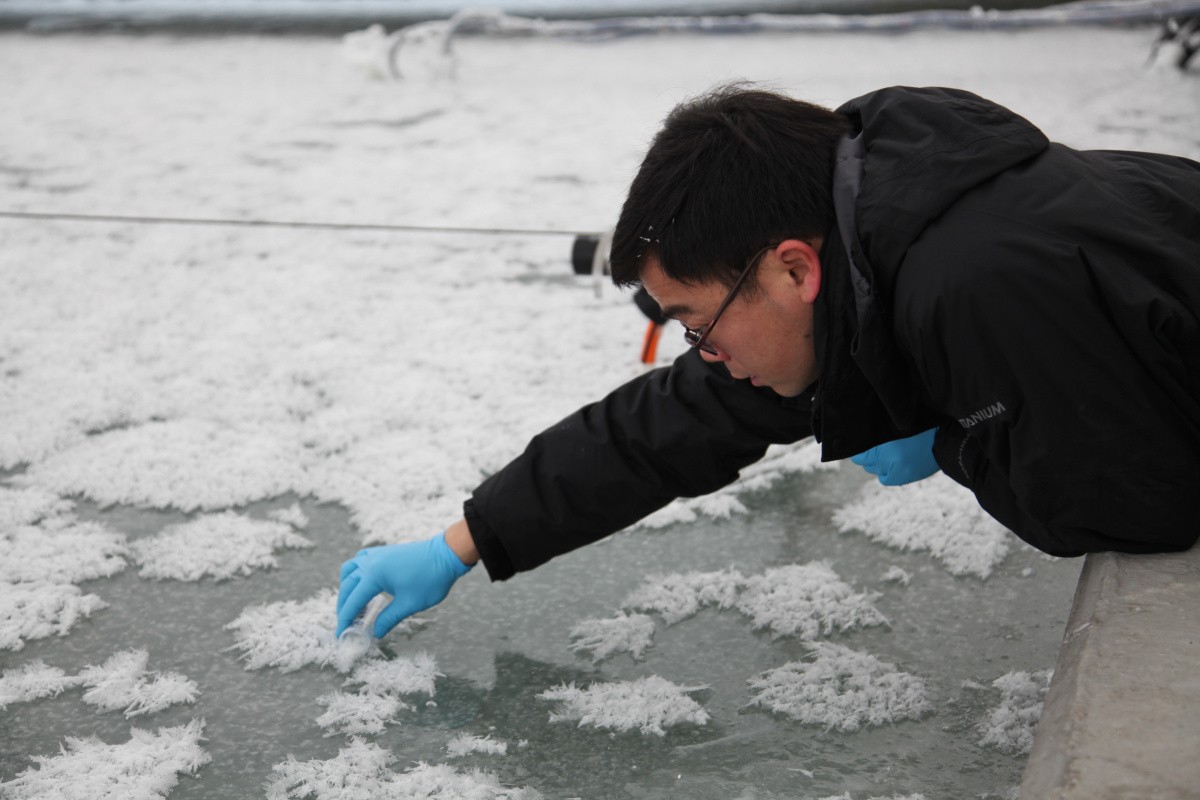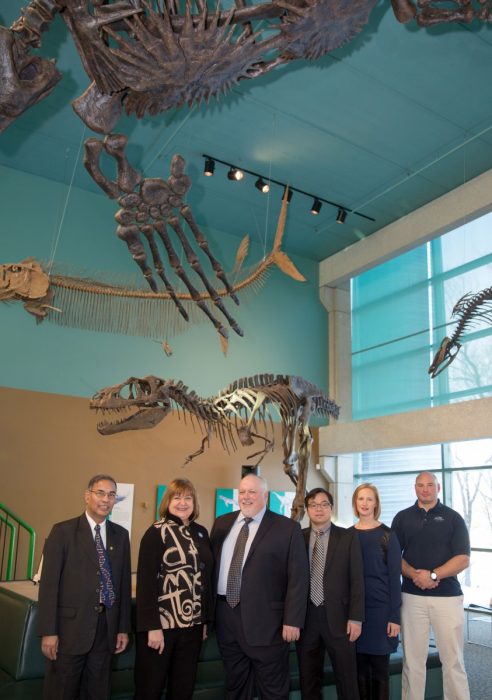
Feiyue Wang collecting frost flower samples for study. // Photo by BeiBei Lu.
$2.4 million in research funding for new and renewed research chairs
Two new Canada Research Chairs (CRC) have been awarded to University of Manitoba professors Kathryn Sibley and Feiyue Wang. A third professor, Jason Treberg, had his Tier 2 CRC renewed.
Sibley’s research will lead to improved rehabilitation services and care and improvements in the healthcare system; Wang is exploring the processes controlling the release, fate and effects of contaminants in Arctic ecosystems; and Treberg’s research examines how mitochondria (small compartments in cells) in animals respond to environmental change and quality.
CRCs are considered research leaders or rising stars in natural sciences and engineering, health sciences, or social sciences and humanities.
The appointments were announced today at the U of M by the Honourable Maryann Mihychuk, Minister of Employment, Workforce Development and Labour, on behalf of the Honourable Kirsty Duncan, Minister of Science. Wang will receive $1.4 million over seven years. Sibley and Treberg each receive $500,000 over five years, for a total award of $2.4 million for the trio.
“I congratulate these three researchers on their success in receiving these funds,” says Digvir S. Jayas, Vice-President (Research and International) and Distinguished Professor at the University of Manitoba. “They are all recognized leaders in their fields and are expanding our knowledge and understanding of complex systems.”
The University of Manitoba has a current allocation of 43 CRCs.

(l-r) Dr. Digvir Jayas (VP Research and International), the Honourable MaryAnn Mihychuk (Minister of Employment, Workforce Development and Labour), Dr. Norman Halden (Dean, Riddell Faculty), Canada Research Chairs Feiyue Wang (environment & geography), Kathryn Sibley (community health sciences) and Jason Treberg (biological sciences).
The researchers
Kathryn Sibley is the new CRC in Integrated Knowledge Translation in Rehabilitation Science (community health sciences). She studies the process of knowledge translation in rehabilitation sciences. Rehabilitation is a specialized area of health care dedicated to optimizing physical function and quality of life. Continuing gaps in the research-to-practice continuum of rehabilitation are related to poorer patient outcomes. Using an integrated knowledge translation research approach, where the end-users of rehabilitation research are involved in the research process from start to finish, her studies identify critical rehabilitation research-to-practice gaps and test methods to close them; promote more consistent research practices to ensure rehabilitation treatments can be accurately compared across studies; and develop new research communication strategies. By increasing the application and use of rehabilitation strategies backed by research evidence, Sibley’s work will help improve the health, function, and quality of life of Canadians.
Jason Treberg is the renewed CRC in Environmental Dynamics and Metabolism (biological sciences). He is examining how environmental factors affect processes in animals at the mitochondrial level. In animal cells small compartments called mitochondria are vital to the conversion of nutrients and molecules for use in the energy demanding processes required for survival and growth. Environmental characteristics, such as temperature, water and the availability and quality of food influence how an animal must budget the use of its available energy. Responses to environmental factors at the small scale mitochondrial level may limit the ability of animals to respond to challenges and their ability to survive and adapt. The insights gained from this research will play a role on issues ranging from the susceptibility of animals to environmental stress to how diet influences an individual’s growth and resistance to metabolism disorders and disturbances.
Feiyue Wang is the new CRC in Arctic Environmental Chemistry (environment and geography). Wang leads research in understanding the release, fate and effects of contaminants in the Arctic under a changing climate. His research has shown that Arctic contamination is driven not only by the amount of contaminants entering the system, but increasingly by climate-induced changes within Arctic ecosystems. A rapidly changing sea ice environment, for instance, alters the transport of contaminants between the air and ocean. It also affects how the contaminants get into marine organisms, throughout the food chain up to beluga whales, seals, and polar bears. Building upon his pioneering research on mercury in sea ice, Wang is expanding his studies to include oil and other emerging contaminants associated with projected Arctic development. This research on the interplay between chemical contamination and climate change will provide critically needed knowledge and tools to improve policies and practices leading to sustainable development in the Arctic under a changing climate.
Research at the University of Manitoba is partially supported by funding from the Government of Canada Research Support Fund.










Congratulations!